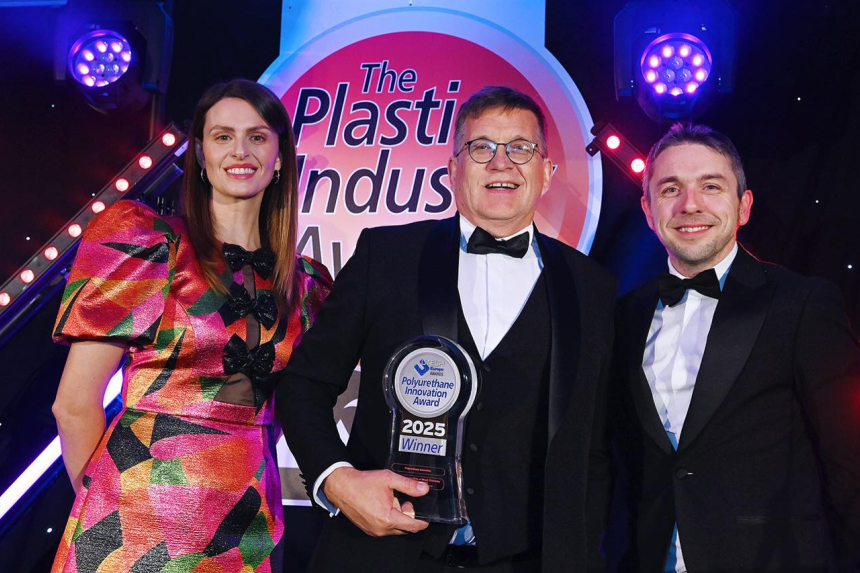LSIWC and Dr. Uģis Cābulis Receive the Plastics Industry Awards 2025 in the Category “Polyurethane Innovation”

(from left) British writer, actress and television personality Ellie Taylor, the host of the awards ceremony; Dr. Uģis Cābulis; and Urethanes Technology International editor Steven Pacitti.
The Latvian State Institute of Wood Chemistry (LSIWC) and Dr.sc.ing. Uģis Cābulis have received the prestigious Plastics Industry Awards 2025 in the category “Polyurethane Innovation”, becoming winners in one of the most significant categories of the year.
This award, presented in London, is one of the most influential recognitions in the polymer sector in the United Kingdom and Europe, highlighting outstanding achievements in materials science, engineering and innovation.
Competition with global leaders
In the category Polyurethane Innovation LSIWC competed with two global industry leaders:
Covestro – one of the world’s largest polymer materials companies with €14.2 billion turnover (2024), 17,500 employees and 46 production sites worldwide, specialising in high-performance polyurethanes, polycarbonates and elastomers.
Evonik – one of the world’s leading specialty chemicals companies with more than 170 years of history, €15.2 billion turnover (2024), and a global innovation portfolio covering tailored polyurethane solutions, advanced technologies and specialised materials for all strategic industries.
Upon receiving the award, Dr. Uģis Cābulis emphasised the importance of teamwork and international collaboration:
“This year has been full of surprises. Who would have thought that the Latvian State Institute of Wood Chemistry would be nominated for a Plastics Industry Awards. But who could have expected that we would win the nomination ‘Polyurethane Innovation’ and receive the award. Thanks to all my colleagues at the Polymer Laboratory and the Latvian State Institute of Wood Chemistry, to all the partners with whom we cooperate in space-related projects, and thanks also to the jury.”
Before the award ceremony, Dr. Uģis Cābulis was invited to a reception at the Latvian Embassy in London.
About the innovation
The Polyurethane Innovation award was granted to LSIWC for a unique thermal insulation material that protects the liquid hydrogen (LH₂) and liquid oxygen (LOX) fuel tanks of the European space launch vehicle Ariane 6 from extreme temperatures. The innovative cryogenic insulation ensures the thermal stability of the tanks even at –253 °C (20 K).
Inside the Ariane 6 tanks, the temperature reaches –193 °C in the LOX tank and down to –253 °C in the LH₂ tank, while the exterior of the launch vehicle on the launch pad may reach +30 °C, and then heat up to +180 °C when passing through the atmosphere at high speed. The insulation layer must maintain its integrity and withstand this extreme thermal load (more than 400 °C difference) without cracking. In addition, the insulation must endure intense vibration and aerodynamic stress during lift-off. The material must also be extremely lightweight and non-flammable, as the exterior surface heats rapidly during ascent. These requirements often contradict each other: materials that perform well at cryogenic temperatures lose strength at elevated temperatures, while increasing strength and fire resistance usually adds weight. The external insulation must also resist cryopumping (the condensation and absorption of atmospheric gases, especially water vapour, into the insulation while on the ground) and ensure minimal outgassing in space. Combining all these properties in one material is a major challenge for materials scientists.
The insulation developed at LSIWC was designed, tested and validated at all Technology Readiness Levels (TRL 3–9) and is successfully used in Ariane 6 flights in 2024 and 2025.
Recognitions
The Plastics Industry Award in the Polyurethane Innovation category adds to a number of other distinctions, including a nomination for the European Polymer Award and recognition by the Latvian Academy of Sciences as one of the most significant scientific achievements of 2024. In October 2025, Dr. Cābulis also received the Paul Walden Medal for outstanding contributions to polymer materials and space technology development. The international Plastics Industry Awards recognition further confirms LSIWC’s competence in developing complex, high-responsibility technologies for the space sector.
In addition to these recognitions, the achievement has also received significant international coverage:
The journal Urethanes Technology International has published an article on the insulation material developed by the Latvian State Institute of Wood Chemistry (LSIWC) and the institute’s victory at the Plastics Industry Awards: ‘Out-of-this-world’ cryogenic foam ascends at Plastics Industry Awards.
A video recording of the award ceremony, including the moment when Dr. Uģis Cābulis receives the Polyurethane Innovation Award, is also available.


